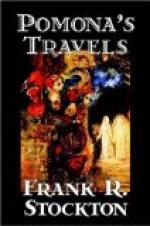“How blithely might
the bugle horn
Chide, on the lake,
the lingering morn!”
and then I went on with the lines until I came to
“Blithe were it then
to wander here!
But now—beshrew
yon nimble deer”—
“You’d better beshrew that steamboat bell,” said Jone, and away we went and just caught the boat. Realistics come in very well sometimes when they take the form of legs.
The steamboat took us over nearly the whole of Lake Katrine, and I must say that I was so busy fitting verses to scenery that I don’t remember whether it rained or the sun shone. When we left the boat we took a coach to Inversnaid on Loch Lomond, and, as we rode along, it made my heart almost sink to feel that I had to leave my poetry behind me, for I didn’t know any that suited this region. But when we got in sight of Loch Lomond a Scotch girl who was on the seat behind me, and had several friends with her, began to sing a song about Lomond, of which I only remember, “You take the high road and I’ll take the low road, and I’ll get to Scotland afore you.”
I am sure I must have Scotch blood in me, for when I heard that song it wound up my feelings to such a pitch that I believe if that girl had been near enough I should have given her a hug and a kiss. As for Jone, he seemed to be nearly as much touched as I was, though not in the same way, of course.
We took a boat on Loch Lomond to Ardlui, another little town, and then we drove nine miles to the railroad. This was through a wild and solemn valley, and by the side of a rushing river, full of waterfalls and deep and diresome pools. When we reached the railroad we found a train waiting, and we took it and went to Oban, which we reached about six o’clock. Even this railroad trip was delightful, for we went by the great Lake Awe, with another rushing river and mountains and black precipices. We had a carriage all to ourselves until an old lady got in at a station, and she hadn’t been sitting in her corner more than ten minutes before she turned to me and said:
“You haven’t any lakes like this in your country, I suppose.”
Now I must say that, in the heated condition I had been in ever since I came into Scotland, a speech like that was like a squirt of cold water into a thing full of steam. For a couple of seconds my boiling stopped, but my fires was just as blazing as ever, and I felt as if I could turn them on that old woman and shrivel her up for plastering her comparisons on me at such a time.
“Of course, we haven’t anything just like this,” I said, “but it takes all sorts of scenery to make up a world.”
“That’s very true, isn’t it?” said she. “But, really, one couldn’t expect in America such a lake as that, such mountains, such grandeur!”
Now I made up my mind if she was going to keep up this sort of thing Jone and me would change carriages when we stopped at the next station, for comparisons are very different from poetry, and if you try to mix them with scenery you make a mess that is not fit for a Christian. But I thought first I would give her a word back:




